10 Tips for Handling Bad Press on Social Media
10 Tips for Handling Bad Press on Social Media
Bad press in the era of social media is every company’s worst nightmare. Everyone has a voice and isn’t afraid to use it. But what to do?
When faced with negative PR, it’s natural to panic. After all, it’s intimidating seeing hundreds or thousands of (heck even just one) negative comments flowing across the screen. Unfortunately, panicking can lead to behavior that just intensifies the ruffled feathers: silence, denial, defensiveness, and more.
Below are 10 tips for handling bad press on social media—starting with having a plan.
1. Have a plan.
Having guidelines in place for handling negative comments is a must at any time, but especially before announcing anything big or trying something new. It allows you to respond calmly and quickly.
Part of your strategy should also include immediately checking your scheduled posts and pausing any that are inappropriate or could make you appear tone deaf to the issue at hand.
2. Listen and monitor.
You should always be listening and monitoring, but during a crisis, it’s imperative that you monitor all the time and have staff on hand to respond. This is critical no matter the size of your social following, but if you’re fortunate enough to have a large following, it becomes even more crucial. You can’t afford not to monitor the social media conversation constantly—and respond regularly.
3. Be human.
Whether your business is B2C or B2B, you’re still communicating with people, not buildings. And those people want to know they’re interacting with living, breathing humans who care. Let your humanity shine through!
4. Take responsibility.
Fess up. Right away.
Companies (and people) who deny culpability for the hot-seat they find themselves in fare much worse than those who accept responsibility for what happened and, when appropriate, apologize. Remaining radio silent is just as bad.
For example, appliance manufacturing company, Miele, published a sexist post for International Women’s Day 2018. The company quickly realized their mistake and pulled the post—which is great—but they never issued an apology, which annoyed people.

5. Respond immediately.
Even if you don’t have a plan, be prepared to respond quickly with something—even if it’s just to say, “We hear you, and we’re working on a solution.”
Your top priorities for the next however-many-hours-it-takes should then be to:
- Write an apology and/or explanation
- Develop a plan for monitoring and managing the communication (if you don’t have one already)
- Work out alternatives to what you announced, if relevant and an option
Don’t wait because you think it will blow over, because it likely won’t for a while.
6. Don’t get defensive or give generic responses.
It’s only human to feel defensive when faced with negative comments, but doing so on your social media channels will only hurt your cause. Generic responses are equally problematic, making you appear uncaring, corporate, and tone deaf.
For example, in 2018, Snapchat set up a bot to auto-reply to tweets about issues with its Snapstreaks, which didn’t sit well with users and set off a stream of people calling them out in a series of “tests.”
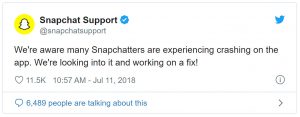
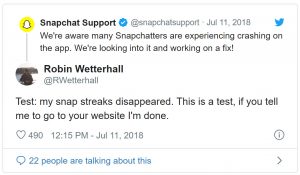
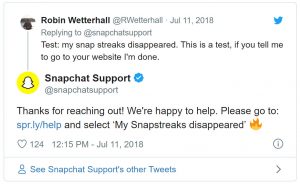
Instead, take time to reply to comments yourself and don’t take negative comments personally. Use them to understand what the issues are, and look at them as a chance to strut your customer service stuff (listening, understanding, apologizing, and/or finding a resolution).
7. Don’t act as if the backlash isn’t happening.
The ostrich approach never works—and will likely make matters worse.
One of my favorite social media fails in this category is an older example from 2011 when Netflix announced it was separating its streaming plan from its DVD offerings (as it violates so many of the tips in this post). Not only did they ignore the comments they were receiving, they waited two months to apologize (#5), deleted comments on Facebook (#8), disabled commenting on their blog (#9), and announced Qwikster two months later, even though the original backlash had yet to die down (#10). Their silence was deafening.
The other reason I like it, though, is it also reinforces that rarely do social media fails sink a company. Netflix survived this flub and went on to launch an industry.

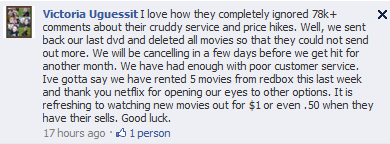
8. Don’t delete. Don’t delete. Don’t delete.
Did I mention you shouldn’t delete negative comments, unless inappropriate, like foul language? In that instance, make sure you’re clear about why—that it’s not the negative comment, it’s the choice of words used that resulted in the removal.
But wait, what about hiding the comments instead? Same still applies. Unless the post contains inappropriate content, is spam/self-promoting, or violates your channel’s rules of engagement, don’t hide it.
9. Keep blog commenting enabled.
People like having a voice, and taking that away—whether through deleting or disabling comments—will just make them mad. Plus, you’re only limiting their voice on your channels, not anywhere else. Keep the conversation in your sandbox and strut your stuff.
10. Avoid any additional big changes.
Deal with the problem at hand before making any additional big announcements, especially if there’s any chance it could further ruffle feathers.
In the Netflix example noted above, Reed Hastings waited two months to apologize for the original announcement, but he wrapped that apology (which many felt was a backhanded one) with an announcement that they were now breaking these two separately priced services into two companies and websites. The community response? The same as occurred with the pricing announcement.
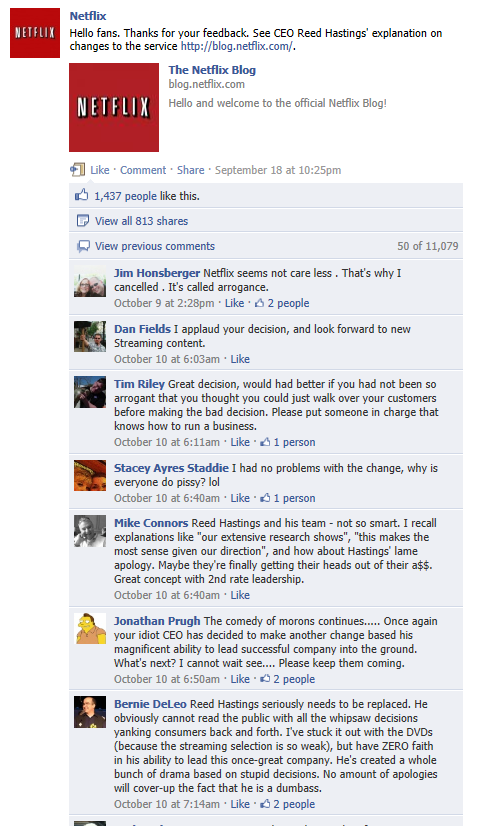
Bonus tip: Use the power of social media before making a major announcement.
If you can, capture the pulse of your customers before making big changes. Pose a question on your social channels. Do a poll. Find people with whom you can test the waters. Employ crowdsourcing. There are many ways to tap the collective power of your social community before launching something new. Take advantage of them.
And if you’re considering crowdsourcing, read the HBR article, “Why Crowdsourcing Often Leads to Bad Ideas.” It offers some great insights into ensuring you don’t end up with a bad idea.






